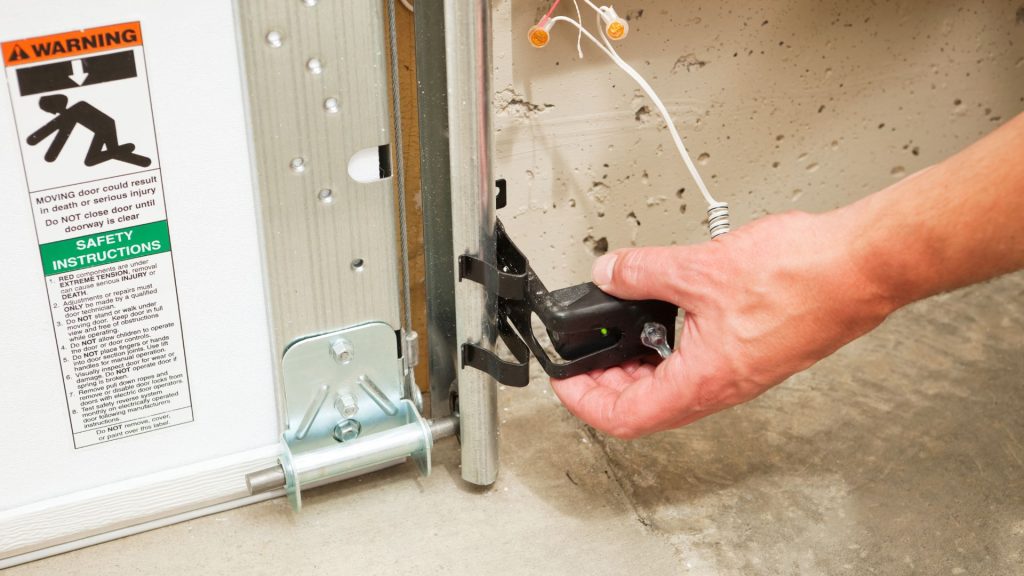
Garage door sensors are a small part of your garage door system, but when they stop working—especially here in Denver—they can bring everything to a screeching halt. If your garage door refuses to close or seems to have a mind of its own, the problem might just be those little sensors sitting near the bottom of your door.
The good news? You don’t always need to call in the pros right away. With a few simple steps, you can learn how to reset garage door sensors that aren’t working properly—and possibly save yourself a service fee in the process. Let’s walk through the causes, the reset process, and when you do need to bring in a professional.
Why Your Garage Door Sensors Might Stop Working
Garage door sensors are basically your garage door’s built-in safety system. Located near the floor on both sides of the door, these sensors use an invisible beam to detect objects (like a person or pet) in the path of the closing door.
When the sensors aren’t working right, your door won’t close—often leaving you frustrated, especially during Denver’s sudden summer storms or freezing winters.
Common Reasons for Sensor Failure:
Misalignment – Even a small bump can knock the sensors out of sync.
Dirt or debris – A leaf or dust can block the beam.
Wiring issues – Loose connections or corrosion over time.
Sunlight interference – Direct sunlight (yep, common in Denver!) can confuse the sensors.
Electrical issues – Power surges or outages may reset or disable the sensors.
Now that we know the “why,” let’s get into the “how.”
How to Reset Garage Door Sensors That Aren’t Working Properly
If you’re not sure where to start, don’t worry. Resetting your garage door sensors isn’t rocket science. It’s more like tech troubleshooting 101.
Step-by-Step: Resetting Your Garage Door Sensors
1. Power Down First
Start by disconnecting the power to the garage door opener. You can do this by unplugging it from the ceiling outlet or turning off the breaker. This protects you from any electrical mishaps while working on the sensors.
2. Clean the Sensor Lenses
Wipe down the sensors gently with a soft cloth. Dust, cobwebs, or even a water spot can cause malfunctions. Make sure the lenses are crystal clear.
3. Check the Alignment
The sensors should be facing directly at each other. You’ll usually see a steady light on each when they’re aligned correctly. If one of the lights is blinking or off, try adjusting it slightly until both are solid.
4. Inspect the Wiring
Check for any loose or frayed wires. Denver’s cold winters can be rough on garage wiring. If anything looks worn or damaged, you might need to replace the wiring—or at least call a technician to inspect it.
5. Reconnect Power and Test
Plug the garage door opener back in or flip the breaker. Try closing the garage door. If it works—great! You’ve successfully reset your garage door sensors.
If it still won’t close properly, you might need to fully reset the garage door opener unit. Most openers have a reset button or require you to hold down the “learn” button to refresh the system.
Still Not Working? Here’s When to Call a Pro
Sometimes, garage door sensor issues go beyond a simple fix. If your door still refuses to close after cleaning and resetting, or if the lights on the sensors won’t stay on, you may be dealing with:
Sensor failure
Faulty logic board
Electrical shorts
In this case, it’s a good idea to reach out to a Denver garage door repair specialist. They’ll have the tools and know-how to replace sensors or troubleshoot deeper electrical problems safely.
🔧 Need help fast? If you’re near Columbine or the greater Denver area, we’ve got you covered. Check out our blog on What to Do When Your Garage Door Spring Breaks in Columbine, CO for more local tips.
Garage Door Sensor Tips for Denver Homeowners
Denver’s mix of sun, snow, and elevation can be tough on garage equipment. Here are a few quick tips to keep your sensors running smoothly year-round:
Avoid direct sunlight: If possible, install sun shields or shade the sensors during peak sunlight hours.
Keep them clean: Make sensor lens cleaning part of your seasonal home maintenance.
Look for blinking lights: Most garage door sensors blink when there’s a problem. Don’t ignore them!
Be proactive before winter: Cold weather and snow piles can shift sensor alignment or cause freezing issues.
Final Thoughts: Don’t Let a Sensor Hold You Hostage
Garage door sensors may be small, but they’re a big deal when they stop working. Knowing how to reset garage door sensors that aren’t working properly gives you peace of mind—and possibly a little extra time before you need to call a technician.
And hey, sometimes the issue really is just a dusty lens or a slightly off-kilter bracket. Either way, you’re now equipped to handle it.
Need Help with a Garage Door Sensor in Denver?
If you’ve tried everything and your garage door still won’t budge, give us a call. We’re local to the Denver metro area and specialize in garage door repairs—from sensor realignments to spring replacements and everything in between.
Call now for a same-day appointment.
🔧 Professional. Reliable. Local.
